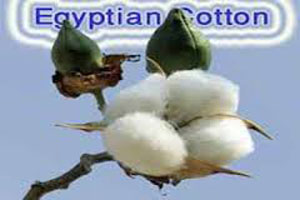
Egypt working to boost cotton cultivation across different provinces
YarnsandFibers News Bureau 2015-03-17 15:00:00 – EgyptEgyptian authorities to bring its core agricultural sector back to life are working to boost local cotton cultivation. The Ministry of Agriculture has set an April 30th deadline for planting cotton and is conducting laboratory tests to determine seed quality. In addition, the ministry will identify certain cotton varieties for cultivation across various governorates.
After several years of neglect, the ministry is serious in its efforts to implement its plan this year to support the cultivation of cotton across different provinces said Abdul Kareem al-Masry of the ministry's Central Administration for Seed Production (CASP).
The biggest problems in the cotton sector are low prices and the chaos of harvesting, storage and subsequent transport to factories for manufacturing. A unified planting season should improve the situation.
Fifty acres of land are being cultivated solely for seed production in preparation for the upcoming season, al-Masry added.
Cultivated area should reach 300,000 acres this year with crop yields expected to reach two million kantars, at a price of 1,250 to 1,400 Egyptian pounds ($164 to $184) each, depending on quality.
This price is subject to increase according to international cotton prices, but will not go down as has previously been the case.
The decline in cotton production was due to markets flooded with the cheaper imported version, which has been able to compete with local production , said agricultural engineer and ministry research advisor Fakhry Attallah.
Tax and non-tax restrictions will be imposed on certain types of textile imports, giving Egyptian cotton a better chance on the domestic market. Support also will be provided for textile factories so they can continue operating.
Price and quantity regulation before the start of planting should exponentially increase cultivated land in the next couple of years.
Local factories would then go back to using Egyptian cotton and textiles instead of relying on exports, which would make Egypt competitive at the global level in cotton production.
According to Attallah, cotton cultivation is not the sole responsibility of the Ministry of Agriculture. The Ministry of Education also should direct efforts towards capacity building with schools offering training to students and encouraging them to take an interest in the cotton industry.
Students can do practical courses at cotton plantations in several Egyptian provinces, which would help train a young generation interested in cultivating this crop.
This year, CASP will conduct the necessary lab tests in co-operation with the agriculture ministry to ensure healthy and high quality seeds before planting.
The ministry also is using 10 varieties of cotton across 19 provinces, while banning others labeled commercially unviable.
This distribution will guarantee sales for farmers, as well as encourage pre-cultivation agreements with factories before the start of the [planting] season, which will encourage cotton cultivation once again and push prices up.
In the year 2000, Egypt cultivated 518,000 acres of cotton, but the number fell to 325,000 by 2010 and 217,000 by 2014.
Market Intelligence
Ask for free sample Report

experience
Customer Base
dedicated team
Countries Served Worldwide









